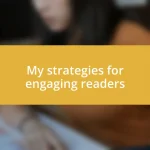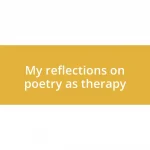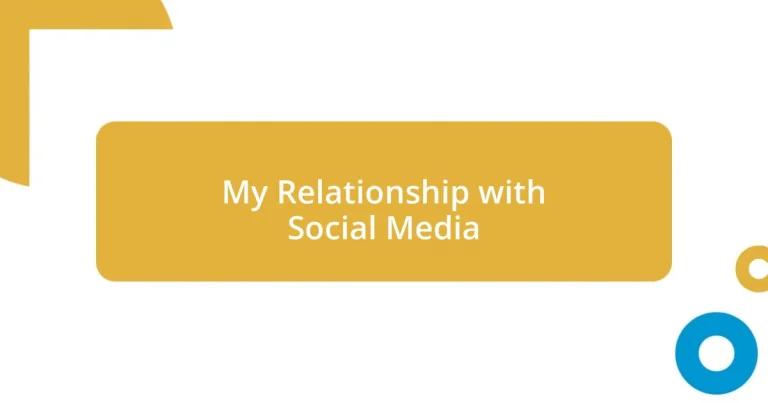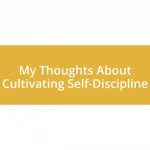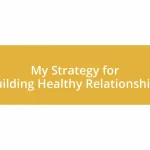Key takeaways:
- Social media can be a double-edged sword, offering motivation and community while also triggering self-doubt and comparison.
- Curating a positive feed by unfollowing negative accounts fosters mental well-being and authentic connections.
- Intentional strategies like setting time limits and engaging meaningfully can enhance the social media experience and protect mental health.
- Building supportive online communities and setting personal goals transform social media into a tool for growth and genuine connection.
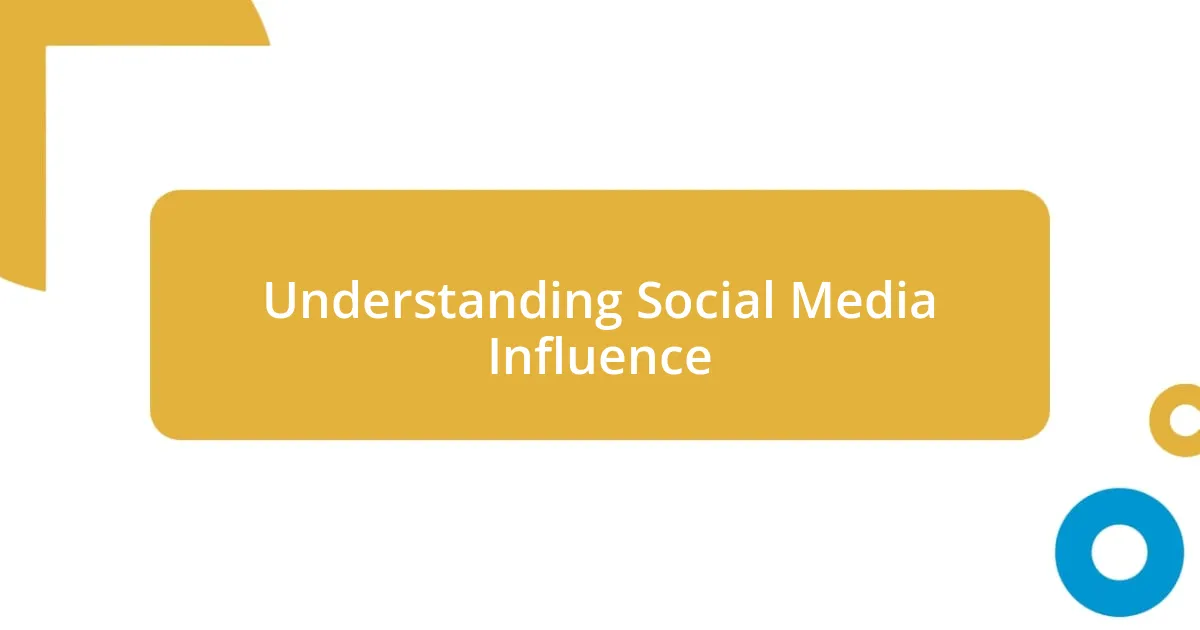
Understanding Social Media Influence
Social media influence seeps into our daily lives in ways we often overlook. I remember scrolling through my feed one afternoon and feeling a pang of envy as I saw a friend’s vacation photos, thinking, “Why doesn’t my life look like that?” This moment made me realize how easily we compare ourselves to others based on curated snapshots.
The truth is, these platforms can amplify both positive and negative feelings. I’ve witnessed how a simple post can spark a community of support or, conversely, how it can lead to a wave of criticism. It makes me wonder, are we more connected or disconnected by these interactions? Real talk: it’s often a mix of both.
I’ve also noticed the power of influencers who showcase their daily routines, advocating for mental health and wellness. Their authenticity resonates with me; it prompts the question: How much can a single post inspire change? Reflecting on my experiences, I see that social media can serve as a double-edged sword—a source of motivation on one hand, and a potential trigger for self-doubt on the other. It’s essential to navigate this landscape mindfully, considering both its light and shadow.
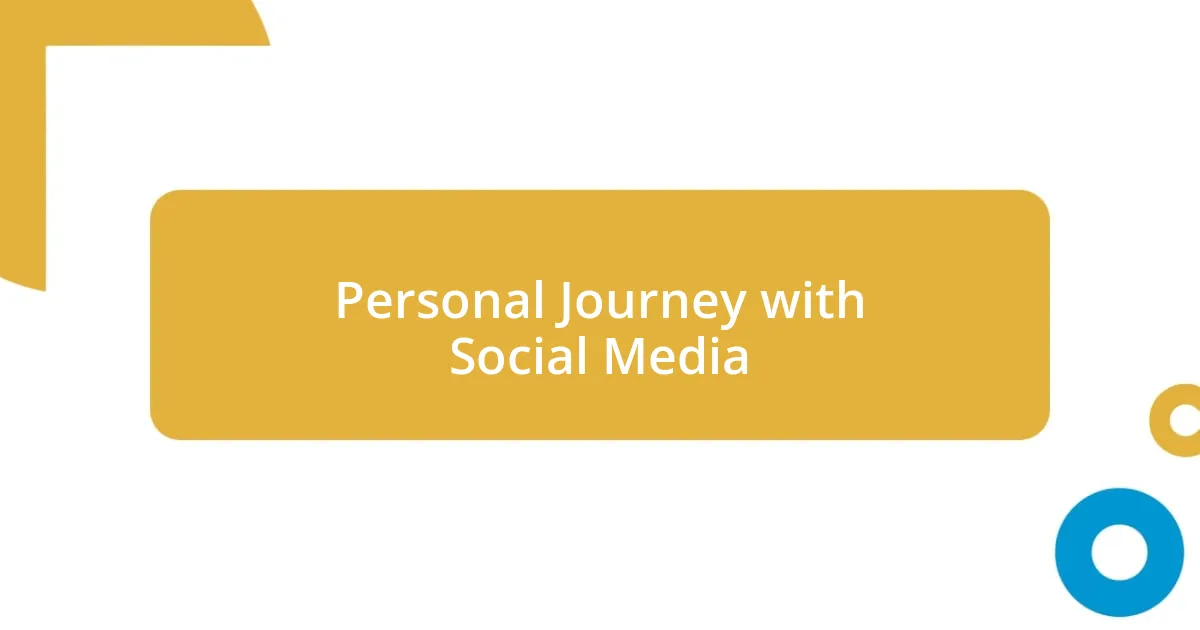
Personal Journey with Social Media
Social media has been a fascinating part of my life, evolving from a space for connection to an arena of emotions. At first, I was excited to catch up with friends and share moments of joy. Yet, as I continued to engage with platforms, I found myself tangled in a web of likes and comments, often measuring my self-worth against virtual applause. It was during a late-night scroll that I felt a deep sense of isolation; I realized that hours spent online didn’t equal genuine connection.
As time went on, I began to curate my feed more thoughtfully, unfollowing accounts that left me feeling drained or unhappy. Instead, I sought out voices of authenticity, those who spoke candidly about struggles and triumphs. One day, I stumbled upon a post from a writer discussing her battle with anxiety. Her bravery struck a chord with me and opened my eyes to the power of vulnerability in fostering community. I now recognize that sharing my own challenges has made my social media experience far more enriching.
This journey has transformed my relationship with social media—it’s no longer just about scrolling through pretty pictures. It’s become a platform for learning and growth. I’ve learned to view it as a tool that reflects my values. The challenge remains to balance the time spent online while nurturing real-life relationships.
| Experience | Insight |
|---|---|
| Initial excitement connecting with friends | Quickly turned into comparing my life to others |
| Curating my feed for positivity | Vulnerability fosters genuine connections |
| Learning to balance online and real-life relationships | Social media as a tool for personal growth |
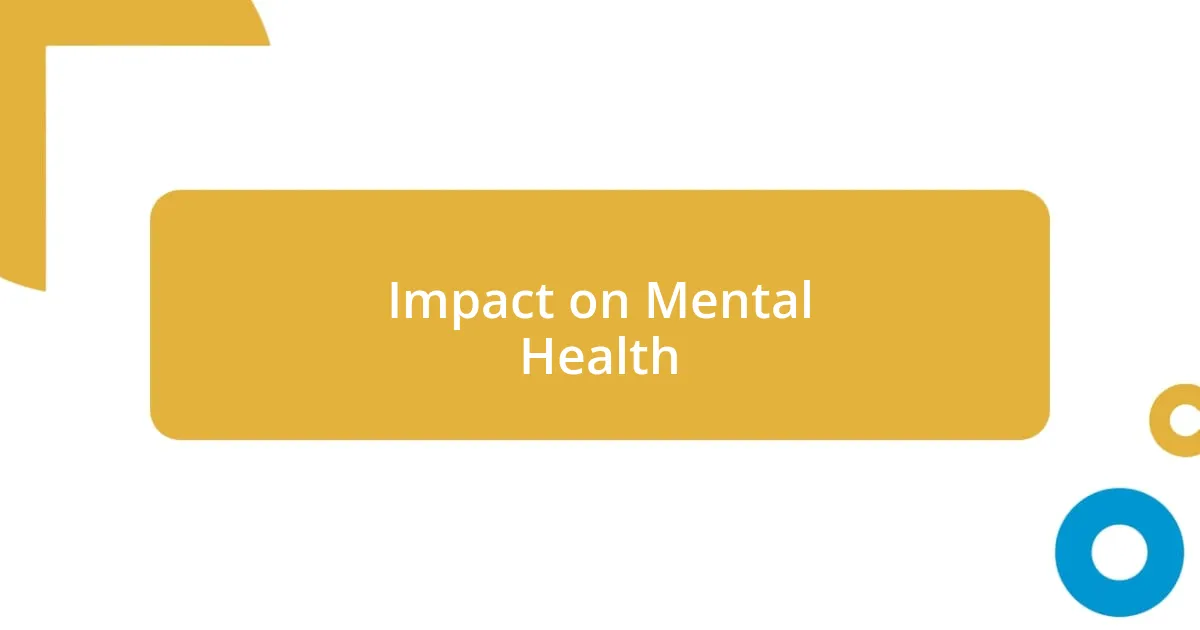
Impact on Mental Health
The impact of social media on mental health is undeniable. I recall a time when I felt overwhelmed after seeing constant posts about success and happiness, which only led to feelings of inadequacy. Those moments of scrolling became a cycle of self-doubt; a digital echo chamber that magnified my insecurities rather than alleviated them.
- Social comparison can lead to feelings of inadequacy or low self-esteem.
- Extended screen time might contribute to anxiety and depression.
- Constant exposure to curated lives can foster unrealistic expectations.
- Engaging with negative or toxic content can diminish overall well-being.
- Conversely, positive interactions can enhance feelings of support and community.
It’s fascinating to consider how social media can both uplift and hinder our mental health. I remember feeling a surge of joy when a friend reached out to share a kind word on one of my meaningful posts. Those moments remind me that while social media can amplify negative emotions, it also has the power to create uplifting connections that contribute positively to our mental well-being.
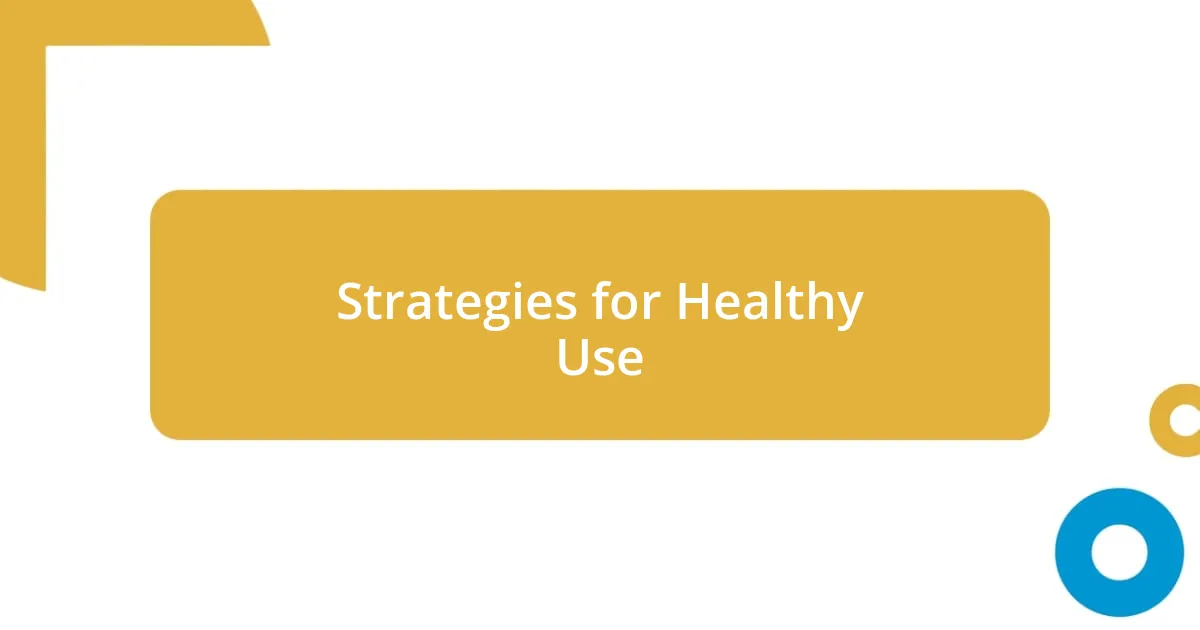
Strategies for Healthy Use
Creating a healthy relationship with social media requires intentional strategies. One approach I’ve found effective is setting specific time limits for my engagement. I often use app timers to remind me when it’s time to log off. It’s surprising how quickly I can lose track of time while scrolling, and having that boundary in place helps me focus on what really matters—like enjoying a walk or connecting with friends face-to-face.
I’ve also started to prioritize quality over quantity in my interactions. Instead of simply liking posts, I make an effort to leave meaningful comments. This shift has transformed my experience; I feel more engaged with my friends and more connected to their lives. Have you ever noticed how a thoughtful message can brighten someone’s day? I certainly have, and it encourages me to cultivate deeper connections rather than just fleeting exchanges.
Furthermore, I regularly assess the content I consume. If I find myself feeling anxious or down after seeing certain accounts, I don’t hesitate to mute or unfollow them. It’s not just about maintaining a positive feed; it’s about my mental well-being. It’s empowering to curate the content that uplifts me rather than weighs me down. How do you tailor your social media experience? Your emotional health is worth investing in!
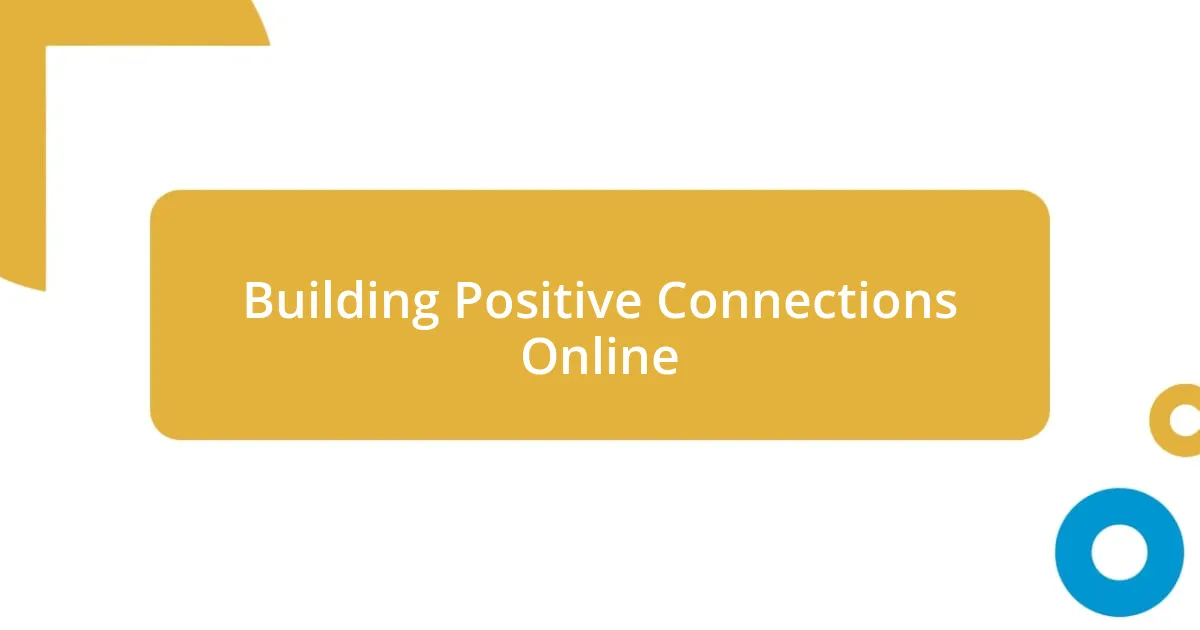
Building Positive Connections Online
Building positive connections online is all about creating an environment that fosters support and encouragement. I’ve found that joining online communities with shared interests often leads to enriching conversations and friendships. For instance, I remember joining a photography group where I not only received constructive feedback on my work but also made genuine connections with fellow enthusiasts. It truly felt like a space where creativity flourished, and encouragement was plentiful.
One tactic I’ve embraced is being more intentional with my interactions. Instead of just scrolling past friends’ milestones, I actively celebrate their achievements by reaching out personally. I can’t tell you how much joy it brings me to send a congratulatory message or a heartfelt emoji when a friend scores a new job or completes a project. It’s these little acts of connection that brighten my day and strengthen our bonds. Have you ever felt uplifted by a simple acknowledgment from someone? Those moments can make all the difference.
Additionally, I pay attention to how I respond to others online. I strive to spread positivity and kindness because I’ve seen firsthand how even a few encouraging words can profoundly impact someone’s day. Last week, I took the time to comment on a post from someone feeling down, sharing my own experiences while reminding them they weren’t alone. It felt incredible to create that ripple of support. When you think about it, positive interactions are powerful—how can we harness that for greater community impact?
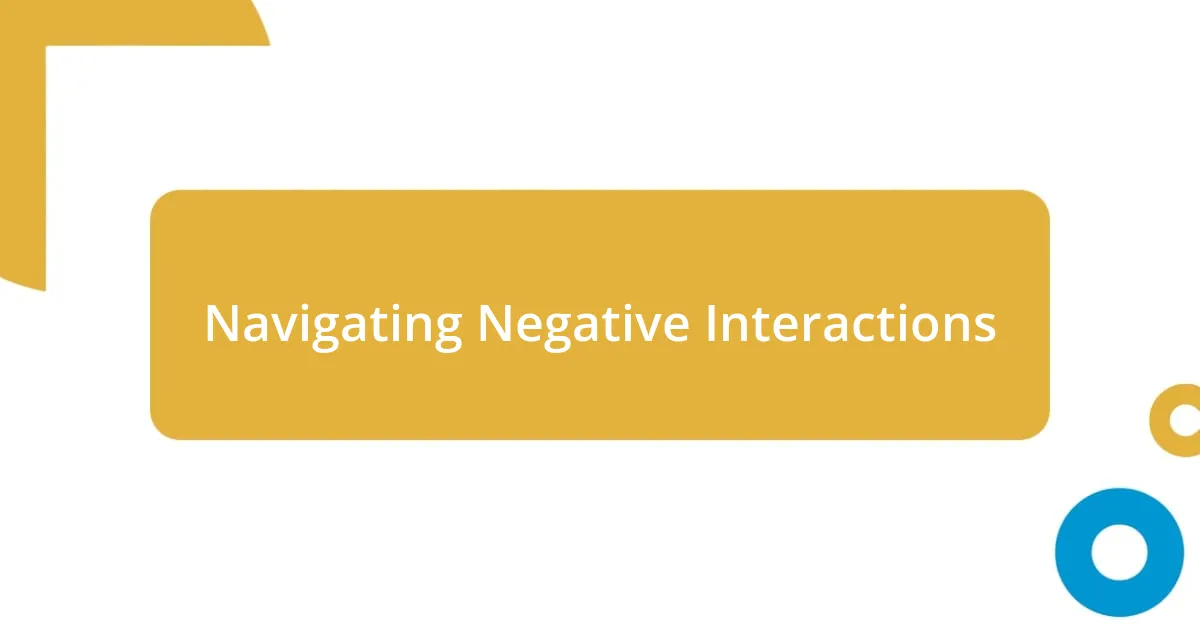
Navigating Negative Interactions
Navigating negative interactions can be quite challenging, and I’ve had my fair share of moments that left me feeling upset or misunderstood. One time, I shared a personal experience that I thought would resonate with my followers, but instead, I was met with harsh criticism. It stung, and I found myself replaying those words in my mind. In that moment, I learned the importance of taking a step back and remembering that not everyone will resonate with my perspective—and that’s okay.
I’ve also realized that managing my emotional responses to negativity is key. When I encounter unpleasant comments, I ask myself: Is this a reflection of me, or is it more about the other person’s struggles? This shift in perspective helps me detach my self-worth from their opinions. There was a time when I chose to address critical remarks directly and diplomatically, which not only diffused tension but also opened a constructive dialogue. Have you tried to engage directly with someone who disagrees with you? It can lead to surprising insights.
Moreover, it’s vital to remember that I have control over my online environment. When negativity strikes, I remind myself that I can mute or block accounts that bring me down. Once, I unfollowed an account that consistently spread negativity, and the difference it made to my mental clarity was remarkable. Creating a positive online space is not just a luxury; it’s essential for my well-being and productivity. How do you curate your social media presence to promote positivity in your own life?
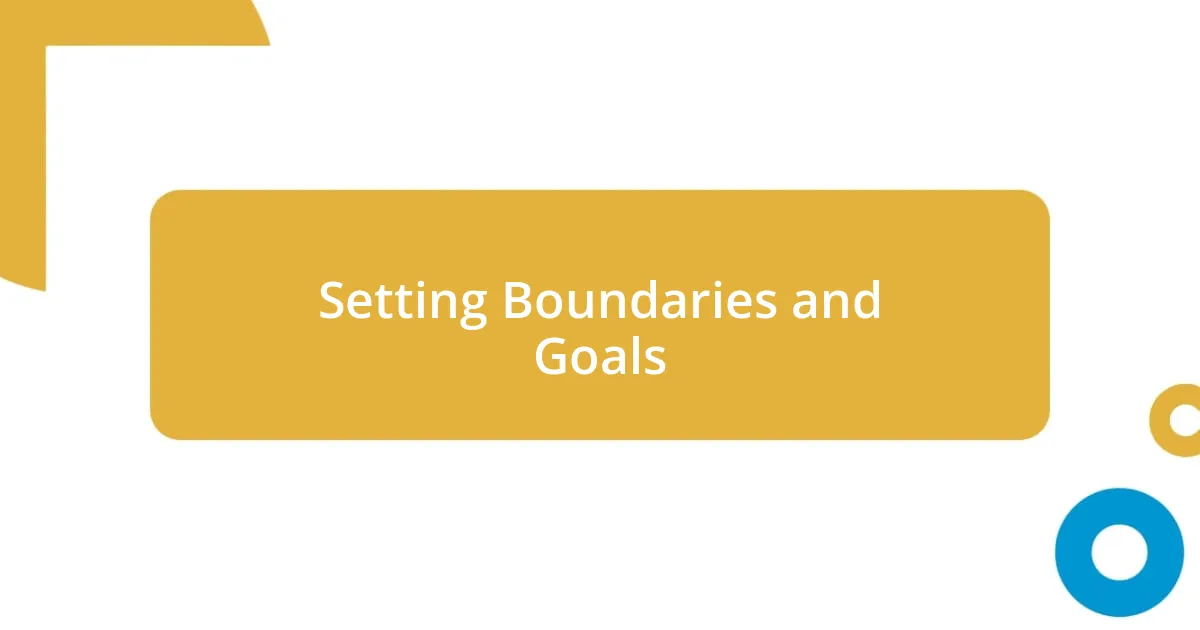
Setting Boundaries and Goals
Setting boundaries in my relationship with social media has become essential for protecting my mental well-being. I remember one stressful week where I noticed that mindlessly scrolling through my feeds deeply affected my mood. I decided to set specific times for checking social media instead of letting it consume my day. This small change allowed me to engage more mindfully and reduced the feelings of overwhelm that often accompanied my online interactions.
Alongside boundaries, I’ve found goal-setting to be incredibly beneficial. I reflect on what I want to achieve with my social media presence. For example, I aim to share meaningful content at least twice a week instead of just posting for the sake of being present. This clarity helps me feel more purposeful in my online interactions and ensures I create a space that aligns with my values.
Have you ever thought about how social media can serve your personal goals? I’ve started using social media as a tool for growth – whether it’s learning something new, networking with like-minded individuals, or inspiring others through my experiences. When I set tangible goals, I notice a shift in my attitude; instead of feeling like a passive consumer, I become an active participant, shaping my online experience to genuinely reflect who I am.

